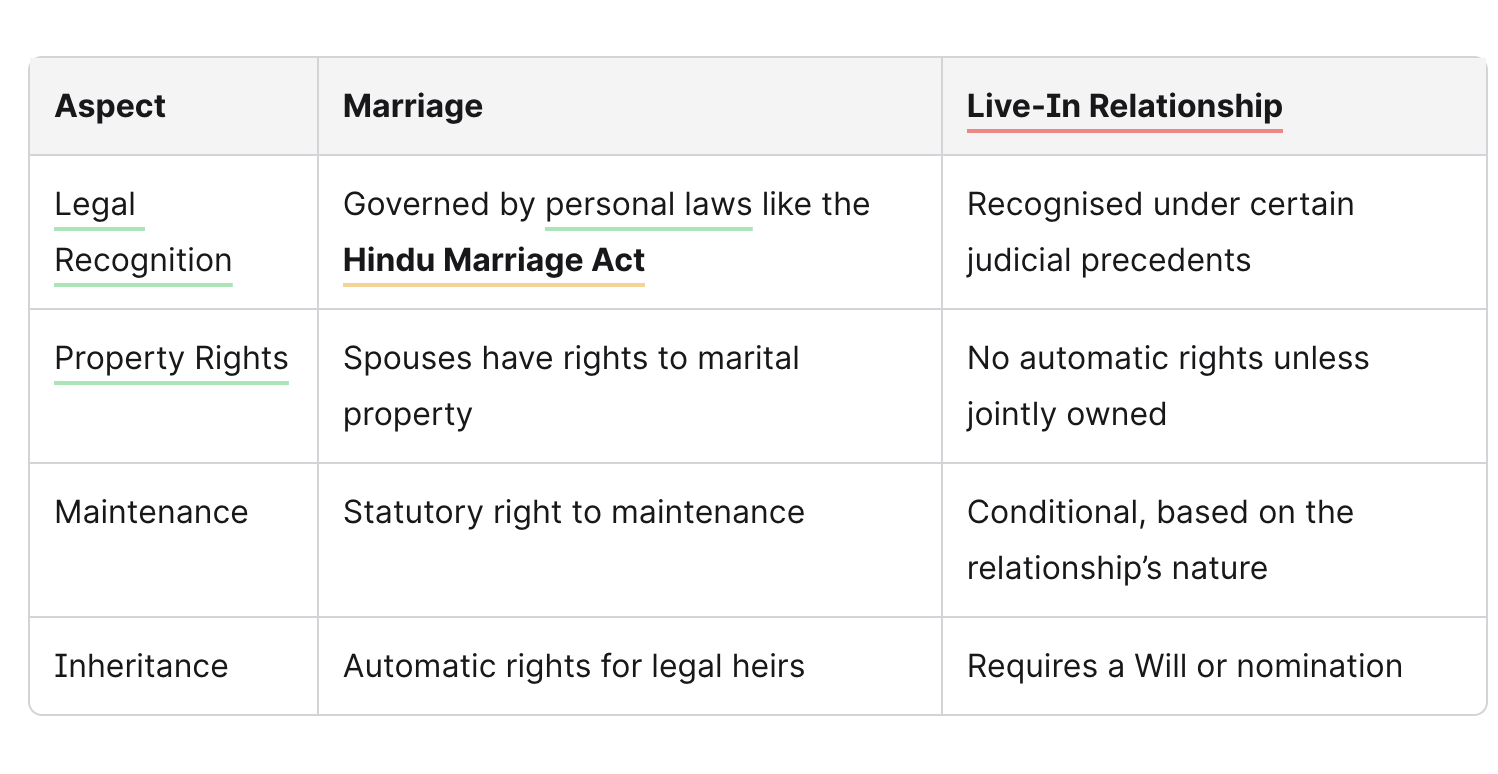Live-in relationships, though once considered taboo in India, are increasingly gaining recognition due to societal changes and landmark legal judgements.
While these relationships remain outside traditional norms, courts and legislations have begun addressing their complexities, especially in the context of estate planning, property rights, and the welfare of individuals involved.
This comprehensive guide delves into the evolving legal framework governing live-in relationships in India, their societal implications, and the key considerations for individuals in such arrangements.
What Are Live-In Relationships?
A live-in relationship refers to an arrangement where two unmarried individuals cohabit and share a long-term domestic life without formalising their relationship through marriage.
Such relationships are based on mutual consent and do not involve legal formalities akin to marriage.
Legal Recognition Of Live-In Relationships In India
Supreme Court’s Stance
The Supreme Court of India has played a pivotal role in recognising live-in relationships under specific circumstances.
The court has held that live-in relationships are permissible and fall within the ambit of the Right to Life and Personal Liberty guaranteed by Article 21 of the Constitution.
Key Judgements:
- Lata Singh v State of Uttar Pradesh (2006): The Supreme Court stated that live-in relationships are not illegal and should not invite societal or legal interference.
- Indra Sarma v VKV Sarma (2013): The court outlined parameters to distinguish live-in relationships from casual relationships, focusing on factors like duration, shared responsibilities, and societal recognition.
Protection Under the Domestic Violence Act, 2005
The Domestic Violence Act, 2005 provides protection to women in live-in relationships, categorising them under the term "domestic relationship."
Women can claim remedies against abuse, financial support, and maintenance under this Act.
Live-In Relationships & Property Rights
Property Rights Between Partners
- Partners in a live-in relationship do not have the same property rights as married couples.
- Any self-acquired property remains with the original owner unless there is a clear agreement or joint ownership arrangement.
- Disputes over shared assets may arise, and it is advisable to maintain proper documentation.
Inheritance Rights
- Partners in a live-in relationship cannot automatically inherit each other’s property unless explicitly mentioned in a Will or other legal documents.
- To secure financial interests, individuals in live-in relationships should seek legal advice and draft a Will specifying the distribution of assets.
Legal Rights Of Children Born In Live-In Relationships
Supreme Court’s Observations
Children born out of live-in relationships are considered legitimate and entitled to inherit their parents' property under Indian law.
The Supreme Court of India clarified this in the landmark case of Tulsa & Ors v Durghatiya & Ors (2008), ensuring that children’s rights are protected regardless of their parents’ marital status.
Custody and Maintenance
- Custody of children in live-in relationships is decided based on the child’s welfare.
- Both parents have financial and emotional responsibilities towards the child.
Estate Planning For Live-In Couples
Importance of Estate Planning
Live-in relationships often lack the legal formalities and protections of marriage, making estate planning crucial to avoid disputes.
Steps to Consider:
- Drafting a Will: Clearly specify asset distribution to avoid confusion.
- Joint Ownership Agreements: For shared assets like property or bank accounts, document ownership rights.
- Nominee Designation: Ensure nominations are updated for investments and insurance policies.
- Legal Advice: Consult an estate planning attorney to address complex scenarios.
Legal Challenges & Societal Pressures
Societal Norms and Acceptance
Despite legal recognition, live-in relationships face societal stigma, especially in conservative setups.
Women in such relationships often bear the brunt of societal judgment.
Legal Complexities
- Lack of uniform laws governing live-in relationships leads to varied interpretations by courts.
- Women may struggle to claim maintenance or financial support without sufficient evidence of the relationship's nature and duration.
Inheritance and Property Disputes
- In the absence of a Will or clear legal agreements, disputes may arise between the surviving partner and the deceased’s legal heirs.
Key Legal Protections For Women In Live-In Relationships
- Protection Against Domestic Violence
- The Domestic Violence Act, 2005 safeguards women from abuse and grants them the right to residence, maintenance, and protection orders.
- Maintenance Rights
- Women can claim financial support under certain conditions, though courts assess the relationship’s legitimacy.
- Property Claims
- Women may claim a share in jointly owned property but cannot assert rights over self-acquired property of the partner unless legally documented.
How Live-In Relationships Differ From Marriage

Steps To Safeguard Rights In A Live-In Relationship
- Legal Agreements
- Draft agreements specifying financial responsibilities and property ownership to prevent future disputes.
- Estate Planning
- Include the partner in the Will and update nominations for financial assets.
- Evidence of Relationship
- Maintain documentation to substantiate the relationship’s nature and duration in case of legal challenges.
The Bottom Line: How Yellow Can Help

Live-in relationships in India are gaining gradual acceptance, backed by judicial support and evolving societal norms.
However, they still lack the comprehensive legal framework afforded to marriage, making proactive measures like estate planning and legal documentation crucial.
For individuals in live-in relationships, understanding their legal rights and responsibilities is essential to protect their interests and ensure a secure future.
By addressing property, inheritance, and maintenance issues through appropriate legal channels, live-in couples can navigate their relationships with confidence and clarity.
At Yellow, we can help you with your unique situation and with all aspects of estate planning, including Wills, Trusts, Powers of Attorney, Gift Deeds, Legal Heir and Succession Certificates, and Living Wills. We also offer post-demise and asset transfer services. Our team of legal experts has more than 50 years of combined experience.




